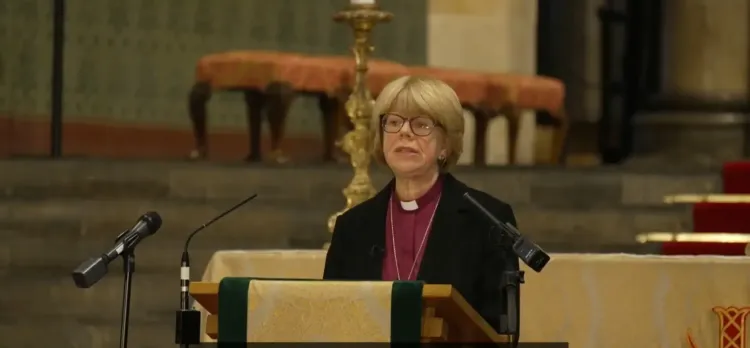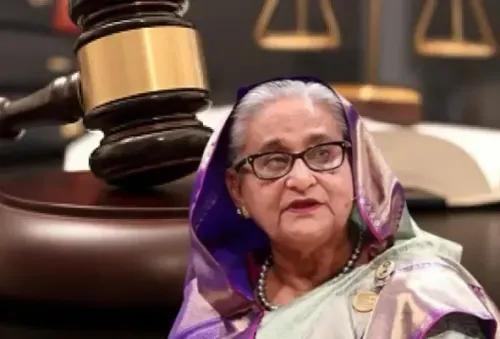Is Sarah Mullally the First Woman to Lead the Church of England?

Synopsis
Key Takeaways
- Historic Appointment: Sarah Mullally is the first female Archbishop of Canterbury.
- Over 35 Years of Experience: She has a long-standing career in nursing and leadership.
- Response to Violence: Mullally condemned recent violent incidents, reinforcing her commitment to unity.
- Tradition vs. Change: Her appointment highlights ongoing tensions within the Anglican Communion.
- Inspiration for Future Generations: Mullally hopes to inspire young women to pursue their dreams.
London, Oct 3 (NationPress) In a groundbreaking development in its more than 1,500-year history, the Church of England has appointed its first-ever female leader, with Sarah Mullally, a nurse-turned-cleric, taking on the prestigious role that had been vacant for nearly a year.
The BBC reported that Dame Sarah Mullally, 63, has been designated as the new Archbishop of Canterbury.
Having served over 35 years as the Chief Nursing Officer for the National Health Service, Mullally was ordained as a priest in 2006 and became the first female Bishop of London in 2018, making her the third-highest ranking clergy member in the Church of England.
While the monarch is technically the head of the Church of England, the Archbishop of Canterbury serves as the most senior bishop and the spiritual leader for the church and the global Anglican Communion.
According to tradition, the selection process for a new Archbishop involves presenting a name to the Prime Minister, who then relays it to the monarch.
Prime Minister Sir Keir Starmer expressed his support for Mullally's appointment, stating, "I wish her every success and look forward to collaborating with her."
In a statement from Buckingham Palace, King Charles III congratulated her on her new responsibilities, emphasizing their significance within the UK and the larger global Anglican community.
Despite this historic moment, some criticism arose regarding her appointment. The Global Fellowship of Confessing Anglicans, representing conservative viewpoints, voiced their concerns, asserting that while some may embrace this change, "the majority of the Anglican Communion still believes that the Bible mandates a male-only episcopacy," as reported by the BBC.
Women were first ordained as priests in the Church of England in 1994, followed by the first female bishops two decades later in 2014.
Although Mullally will officially assume her role after her confirmation of election in January, with an enthronement service to follow after paying homage to the King, she made her inaugural public statement condemning the "horrific violence" of Thursday's attack on a synagogue in Manchester.
"Hatred and racism cannot tear us apart," she declared.
When asked by the BBC about her contributions to her new position, Mullally said, "I have had experiences as a nurse leading complex organizations, as the government's chief nursing officer, and also a diocese that is very diverse in London. I recognize that I cannot do it alone and need to collaborate with other colleagues."
She acknowledged the historic significance of being the first woman in this role, noting that her presence often inspires young women in schools to consider their own possibilities for the future.
The Church of England has been without official leadership for nearly a year following Justin Welby's resignation due to a safeguarding scandal, which implicated him for not reporting a prolific child abuser associated with the Church.
Archbishop of York Stephen Cottrell temporarily took over many of Welby's responsibilities and was a voting member of the committee responsible for selecting his successor, despite facing calls to resign over his handling of an abuse case.









